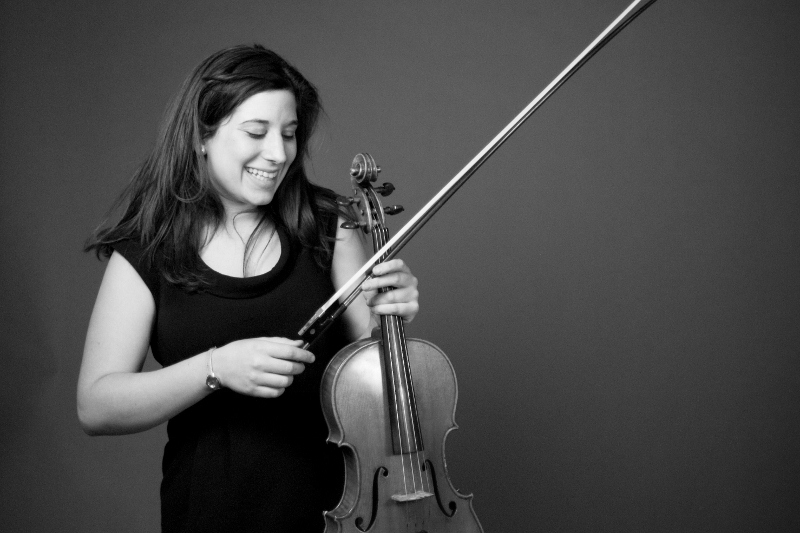 Tell me how you decided to begin your career in music – how old were you, and how did you know you wanted this path? Was there a defining moment, or was it a longer process of internal recognition?
Tell me how you decided to begin your career in music – how old were you, and how did you know you wanted this path? Was there a defining moment, or was it a longer process of internal recognition?
I knew I was going to go into music since high school. It wasn’t until I was getting my Master’s degree that I realized how young I was when I decided to make such a huge decision. It takes so much work to get into music school that you have to decide early on, so you have time to get ready. There was no defining moment, I just always knew.
What is your favorite thing about your instrument?
I love the viola. It is under appreciated, and often over looked! It also has such a unique sound because its dimensions are not standard, unlike the violin and cello.
What is the most interesting place you’ve ever visited as a result of your career – whether traveling for a performance, a teaching gig or for schooling?
Cassalmaggiore, Italy. I went to a summer music festival there, where I had the opportunity to perform as a soloist and as a chamber musician.
What do you say to students that are taking lessons, enjoy playing, but can’t see themselves pursuing music performance in college or pursuing it as a career after college?
Being a professional musician certainly has its merits, but being an amateur (which contrary to popular belief actually means, a lover of something) is just as wonderful. Playing music without the pressure of rehearsals, competitions, and performances is just as fulfilling as making it your job. I would encourage students to keep it up, and explore the art of making music for themselves.
I teach music not so that my students will major in music, but so that they will be sensitive, understand humanity, recognize beautiful things, have pride in themselves, and be compassionate human beings.
What sacrifices have you made in order to have the career that you now have?
Being a professional musician demands much of your time, and is a huge commitment. Because of the amount of work it takes, and the competitive nature of the field, I had to make the decision to go this route when I was 16. This definitely impacted my social life! I also went to a music conservatory for my bachelor’s and master’s degrees which meant that I only studied music at school. Looking back, I wish I would have had time to pursue other areas of interest, but I am finding time to do those things now!
What about your career could you do without?
I feel like the classical music community has done a poor job of making our music accessible to the majority of people in the world. I have a problem with closed-minded musicians, who don’t don’t realize how important it is to expose non-musicians to the power of classical music!
What about your career can you not get enough of?
My students! Each of them is so different and unique. I love learning about them. I also usually leave work in a better mood than when I came!
What music do you listen to in your downtime?
Jazz Standards. I love Frank Sinatra and Sarah Vaughan. I also love Glee!
What other artistic endeavor do you spend time on?
I am a founding member of a classical quintet, Chicago Q Ensemble. We are a non-profit organization whose mission is to transform individuals lives through performance, education, and collaboration. We also present educational programming that connects classical music to the lives of young people. This group is a huge part of my life and another avenue with which I can express myself.
What is your favorite field in the arts that you spend the most time appreciating (Painting? Theatre? Reading?)
I love Musical Theatre and Reading.
What is your favorite piece of advice related to being a musician that you give? And have received?
Every week leaving my violin lessons as a child, my teacher would say “Work hard, Kiddo” That has always stuck with me, and I find myself saying the same thing to my students each week.
I am in the ninth grade and love the viola. I have been accepted at an arts school for fall, 2011. My question is what percentage of people who attend school/college at a music conservatory actually become professional musicians (performance).
Thomas,
I’m gathering an answer for you from Aimee. Check back here shortly.
(Ed note. Response from Aimee Biasiello)
Thomas,
I can’t tell you an actual percent, but I can tell you that it is a really competitive field. Musicians whose goal it is to play in an A orchestra certainly have their work cut out for them, or even in a B orchestra, for that matter. What a lot of music students don’t realize is that there are a lot of other performance options available to them, if they’re creative.
I recommend the book, The Savvy Musician by David Cutler, to open your mind to some possible ideas for a career in music. I wish I had read it when I was in ninth grade!
Best of luck,
Aimee